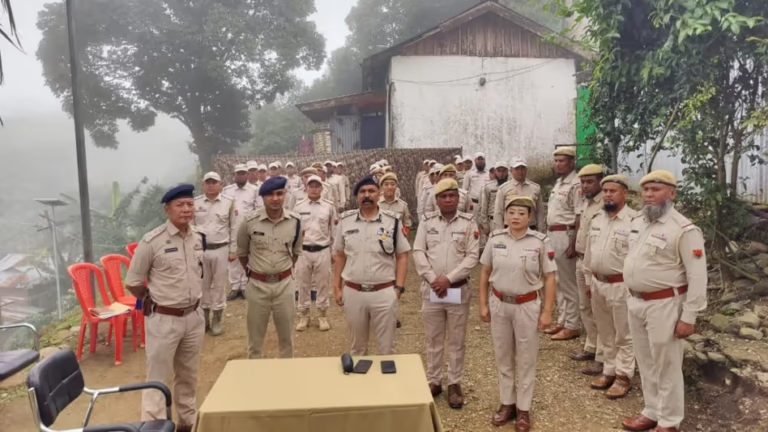Manipur Police Arrest Four in Ukhrul Over Poppy Cultivation
Summary
In a major breakthrough in Manipur’s fight against illegal drug production, authorities arrested four individuals for cultivating poppy in the Ukhrul district. A significant area of approximately 30 acres under illicit cultivation was detected and destroyed as part of the state’s ongoing “War on Drugs” campaign. This operation underscores the government’s firm stance against drug-related activities in the region.
Full Article
Introduction
Manipur, a northeastern Indian state often hailed for its scenic beauty, has been grappling with a grave problem—illicit poppy cultivation. This cultivation feeds the global narcotics trade, posing a significant threat to local communities and law enforcement. Recently, the Manipur Police, in a decisive action, dismantled a large network involved in poppy cultivation in Ukhrul, marking another chapter in the state’s intensified “War on Drugs.”
What Happened in Ukhrul?
On December 1, the police arrested four individuals linked to illegal poppy cultivation in Tankhul Hundung village, located in the Mapithel hill range of Ukhrul. This raid led to the detection and subsequent destruction of approximately 30 acres of illicit poppy plantations. The operation highlighted the meticulous planning and execution by law enforcement agencies to tackle drug-related issues at their root.
The Broader Context: Manipur’s War on Drugs
Since the launch of the “War on Drugs,” Manipur has intensified its focus on eradicating poppy plantations. The campaign seeks to dismantle the infrastructure supporting narcotics production, including cultivation, trafficking, and distribution networks.
Poppy cultivation, particularly in hilly terrains, has posed a persistent challenge. However, the government’s resolve, combined with community participation, has yielded tangible results. In recent years, law enforcement has destroyed hundreds of acres of illegal crops, showcasing their commitment to a drug-free Manipur.
Challenges in Combating Drug Production
Why does poppy cultivation persist despite stringent measures? Several factors contribute:
- Geographical Isolation: Hilly and remote areas provide the perfect cover for illicit cultivation.
- Economic Factors: Poverty and lack of alternative livelihoods push locals to engage in poppy farming.
- Organized Crime: Well-established networks often lure farmers into illegal activities.
The Role of Communities
Interestingly, local communities have played a pivotal role in these operations. Village volunteers and organizations often act as guides and informants, assisting police in navigating tough terrains and identifying hidden plantations. Their support is crucial in ensuring the success of anti-drug campaigns.
In Ukhrul, similar community participation has been instrumental in bringing culprits to justice. Such partnerships not only strengthen trust between the government and citizens but also amplify the campaign’s impact.
What’s Next?
While the recent arrests and destruction of crops mark a significant victory, the battle against drug-related crimes is far from over. Authorities plan to enhance surveillance, provide alternative livelihood options, and increase awareness campaigns in vulnerable areas.
Moreover, stricter legal measures and rehabilitation programs for offenders could offer a long-term solution to the issue.
Impact of the Campaign
The relentless focus on eradicating poppy cultivation has yielded:
- Improved safety in affected regions.
- Increased awareness among communities about the adverse impacts of narcotics.
- Greater support for rehabilitation and livelihood projects.
These efforts not only curb drug-related activities but also pave the way for sustainable development.
Conclusion
Manipur’s decisive action against poppy cultivation highlights the state’s unwavering commitment to tackling the drug menace. Arrests in Ukhrul and the destruction of 30 acres of illicit plantations send a clear message: Manipur will not tolerate activities that endanger its people and future generations. The “War on Drugs” is more than a campaign; it’s a movement to secure a brighter and drug-free tomorrow.
FAQs
- Why is poppy cultivation a problem in Manipur? Poppy cultivation supports narcotics production, leading to drug abuse and organized crime in the region.
- What is the War on Drugs campaign? It is Manipur’s initiative to eradicate drug-related activities through enforcement, awareness, and community participation.
- How do communities contribute to anti-drug operations? Local volunteers assist law enforcement in identifying cultivation areas and providing intelligence.
- What alternatives are being provided to poppy farmers? Authorities are promoting alternative crops and livelihood programs to help farmers transition to legal activities.
- What challenges does law enforcement face? Geographic isolation, organized crime, and economic incentives for poppy cultivation are significant hurdles.

